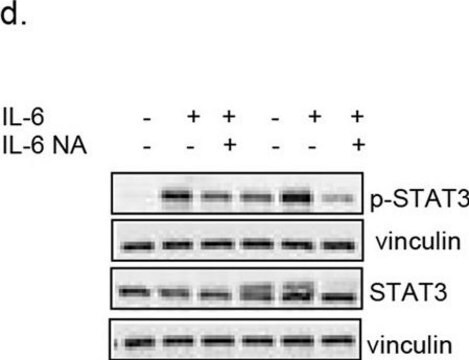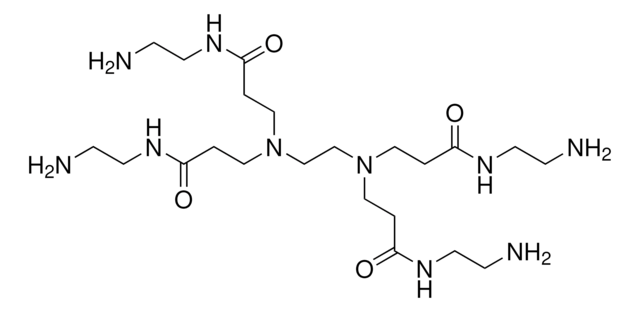推荐产品
生物源
mouse
品質等級
抗體表格
affinity purified immunoglobulin
抗體產品種類
primary antibodies
無性繁殖
R1JHL, monoclonal
物種活性
mouse, rat, human
製造商/商標名
Chemicon®
技術
western blot: suitable
同型
Not specified
UniProt登錄號
運輸包裝
dry ice
目標翻譯後修改
unmodified
基因資訊
human ... GRIN1(2902)
mouse ... Grin1(14810)
rat ... Grin1(24408)
特異性
NMDA受体亚基1(全部剪接变体)。没有观察到与其他NMDA受体亚基的交叉反应性。可通过免疫印迹识别大鼠脑海马匀浆中的103-116 kDa蛋白。
免疫原
大鼠NR1氨基酸1-564的融合蛋白。
表位:(全部剪接变体)
應用
使用经验证可用于WB的抗NMDAR1抗体(全部剪接变体)克隆R1JHL检测NMDAR1。
研究子类别
神经递质& 受体
神经递质& 受体
研究类别
神经科学
神经科学
蛋白质印迹:1:300。建议将抗体稀释在含有5%脱脂牛奶和0.05%叠氮化钠的TBST(20 mM Tris-HCl,137 mM NaCl,1%吐温-20,pH值7.6)中。稀释后的抗体至少可以使用5次,而不会出现明显的信号下降。两次使用之间应储存在2-8°C下。
免疫沉淀:每200μ克裂解物中3μ克将定量沉淀200μ克大鼠脑裂解物中的全部NMDA R1。
最佳工作稀释度必须由最终用户进行确定。
免疫沉淀:每200μ克裂解物中3μ克将定量沉淀200μ克大鼠脑裂解物中的全部NMDA R1。
最佳工作稀释度必须由最终用户进行确定。
外觀
亲和纯化的免疫球蛋白。 冻干。用50μL PBS,pH 7.4复溶。不含防腐剂。
形式:纯化
儲存和穩定性
在接收之日起,将冻干物料在-20°℃下保存长达6个月。 重溶后,以未稀释等分试样在 -20°C 下可保存长达 6个月。应避免反复冻/融循环。
法律資訊
CHEMICON is a registered trademark of Merck KGaA, Darmstadt, Germany
免責聲明
除非我们的产品目录或产品附带的其他公司文档另有说明,否则我们的产品仅供研究使用,不得用于任何其他目的,包括但不限于未经授权的商业用途、体外诊断用途、离体或体内治疗用途或任何类型的消费或应用于人类或动物。
未找到合适的产品?
试试我们的产品选型工具.
儲存類別代碼
10 - Combustible liquids
水污染物質分類(WGK)
WGK 1
閃點(°F)
Not applicable
閃點(°C)
Not applicable
Amino terminal domains of the NMDA receptor are organized as local heterodimers.
Lee, CH; Gouaux, E
Testing null
Lenka Mikasova et al.
Brain : a journal of neurology, 135(Pt 5), 1606-1621 (2012-05-01)
Autoimmune synaptic encephalitides are recently described human brain diseases leading to psychiatric and neurological syndromes through inappropriate brain-autoantibody interactions. The most frequent synaptic autoimmune encephalitis is associated with autoantibodies against extracellular domains of the glutamatergic N-methyl-d-aspartate receptor, with patients developing
Meilin Tian et al.
Scientific reports, 6, 34751-34751 (2016-10-08)
Allostery is essential to neuronal receptor function, but its transient nature poses a challenge for characterization. The N-terminal domains (NTDs) distinct from ligand binding domains are a major locus for allosteric regulation of NMDA receptors (NMDARs), where different modulatory binding
Nami Tajima et al.
Nature, 534(7605), 63-68 (2016-05-03)
The physiology of N-methyl-d-aspartate (NMDA) receptors is fundamental to brain development and function. NMDA receptors are ionotropic glutamate receptors that function as heterotetramers composed mainly of GluN1 and GluN2 subunits. Activation of NMDA receptors requires binding of neurotransmitter agonists to
María Rodríguez-Muñoz et al.
Oncotarget, 6(34), 35458-35477 (2015-10-16)
In the brain, the histidine triad nucleotide-binding protein 1 (HINT1) and sigma 1 receptors (σ1Rs) coordinate the activity of certain G-protein coupled receptors (GPCRs) with that of glutamate N-methyl-D-aspartate receptors (NMDARs). To determine the role of HINT1-σ1R in the plasticity
我们的科学家团队拥有各种研究领域经验,包括生命科学、材料科学、化学合成、色谱、分析及许多其他领域.
联系技术服务部门







